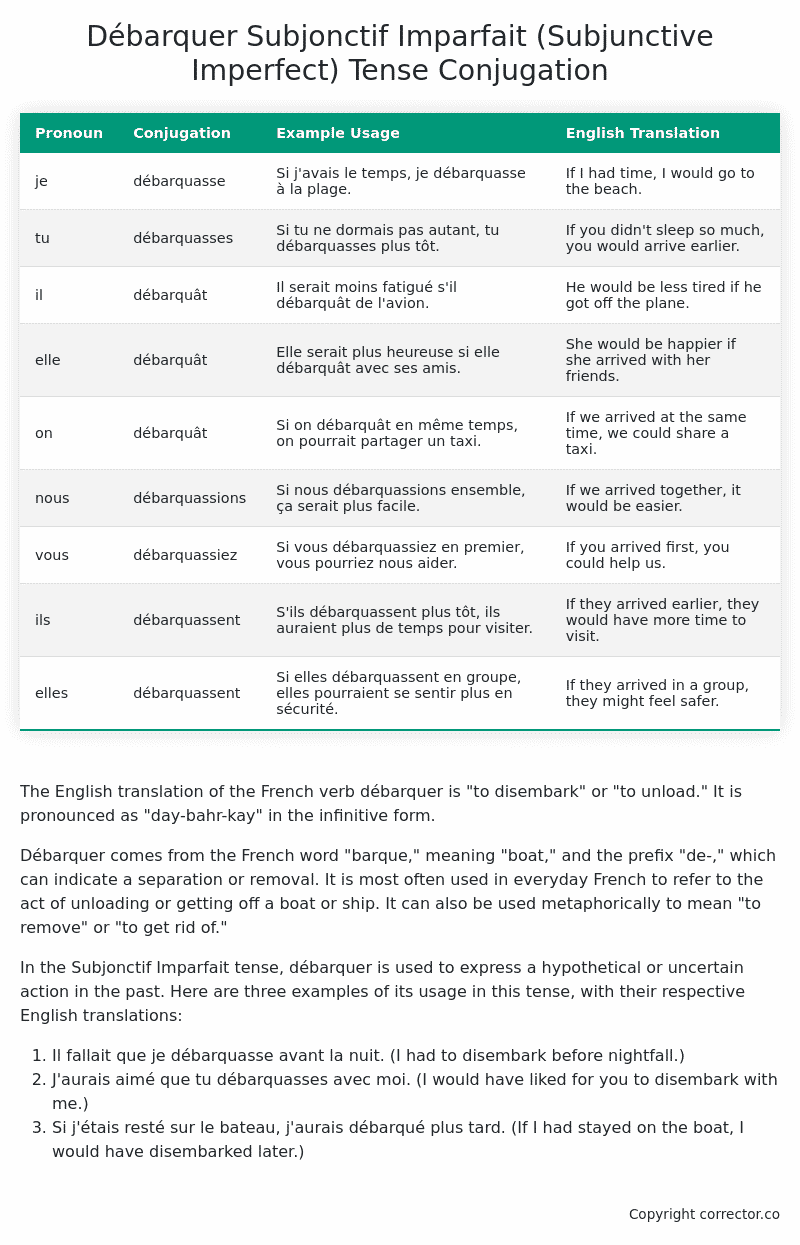Subjonctif Imparfait (Subjunctive Imperfect) Tense Conjugation of the French Verb débarquer
Introduction to the verb débarquer
The English translation of the French verb débarquer is “to disembark” or “to unload.” It is pronounced as “day-bahr-kay” in the infinitive form.
Débarquer comes from the French word “barque,” meaning “boat,” and the prefix “de-,” which can indicate a separation or removal. It is most often used in everyday French to refer to the act of unloading or getting off a boat or ship. It can also be used metaphorically to mean “to remove” or “to get rid of.”
In the Subjonctif Imparfait tense, débarquer is used to express a hypothetical or uncertain action in the past. Here are three examples of its usage in this tense, with their respective English translations:
- Il fallait que je débarquasse avant la nuit. (I had to disembark before nightfall.)
- J’aurais aimé que tu débarquasses avec moi. (I would have liked for you to disembark with me.)
- Si j’étais resté sur le bateau, j’aurais débarqué plus tard. (If I had stayed on the boat, I would have disembarked later.)
Table of the Subjonctif Imparfait (Subjunctive Imperfect) Tense Conjugation of débarquer
| Pronoun | Conjugation | Example Usage | English Translation |
|---|---|---|---|
| je | débarquasse | Si j’avais le temps, je débarquasse à la plage. | If I had time, I would go to the beach. |
| tu | débarquasses | Si tu ne dormais pas autant, tu débarquasses plus tôt. | If you didn’t sleep so much, you would arrive earlier. |
| il | débarquât | Il serait moins fatigué s’il débarquât de l’avion. | He would be less tired if he got off the plane. |
| elle | débarquât | Elle serait plus heureuse si elle débarquât avec ses amis. | She would be happier if she arrived with her friends. |
| on | débarquât | Si on débarquât en même temps, on pourrait partager un taxi. | If we arrived at the same time, we could share a taxi. |
| nous | débarquassions | Si nous débarquassions ensemble, ça serait plus facile. | If we arrived together, it would be easier. |
| vous | débarquassiez | Si vous débarquassiez en premier, vous pourriez nous aider. | If you arrived first, you could help us. |
| ils | débarquassent | S’ils débarquassent plus tôt, ils auraient plus de temps pour visiter. | If they arrived earlier, they would have more time to visit. |
| elles | débarquassent | Si elles débarquassent en groupe, elles pourraient se sentir plus en sécurité. | If they arrived in a group, they might feel safer. |
Other Conjugations for Débarquer.
Le Present (Present Tense) Conjugation of the French Verb débarquer
Imparfait (Imperfect) Tense Conjugation of the French Verb débarquer
Passé Simple (Simple Past) Tense Conjugation of the French Verb débarquer
Passé Composé (Present Perfect) Tense Conjugation of the French Verb débarquer
Futur Simple (Simple Future) Tense Conjugation of the French Verb débarquer
Futur Proche (Near Future) Tense Conjugation of the French Verb débarquer
Plus-que-parfait (Pluperfect) Tense Conjugation of the French Verb débarquer
Passé Antérieur (Past Anterior) Tense Conjugation of the French Verb débarquer
Futur Antérieur (Future Anterior) Tense Conjugation of the French Verb débarquer
Subjonctif Présent (Subjunctive Present) Tense Conjugation of the French Verb débarquer
Subjonctif Passé (Subjunctive Past) Tense Conjugation of the French Verb débarquer
Subjonctif Imparfait (Subjunctive Imperfect) Tense Conjugation of the French Verb débarquer (this article)
Subjonctif Plus-que-parfait (Subjunctive Pluperfect) Tense Conjugation of the French Verb débarquer
Conditionnel Présent (Conditional Present) Tense Conjugation of the French Verb débarquer
Conditionnel Passé (Conditional Past) Tense Conjugation of the French Verb débarquer
L’impératif Présent (Imperative Present) Tense Conjugation of the French Verb débarquer
L’infinitif Présent (Infinitive Present) Tense Conjugation of the French Verb débarquer
Struggling with French verbs or the language in general? Why not use our free French Grammar Checker – no registration required!
Get a FREE Download Study Sheet of this Conjugation 🔥
Simply right click the image below, click “save image” and get your free reference for the débarquer Subjonctif Imparfait tense conjugation!

Débarquer – About the French Subjonctif Imparfait (Subjunctive Imperfect) Tense
Formation
Common Everyday Usage Patterns
Interactions with Other Tenses
Subjonctif Présent
Indicatif Passé Composé
Conditional
Conditional Perfect
Summary
I hope you enjoyed this article on the verb débarquer. Still in a learning mood? Check out another TOTALLY random French verb conjugation!


